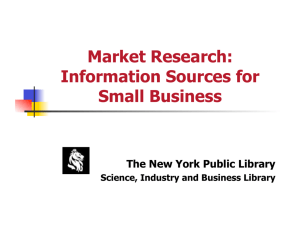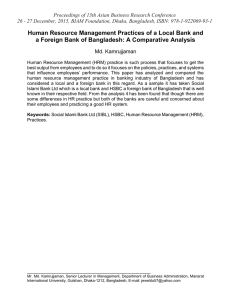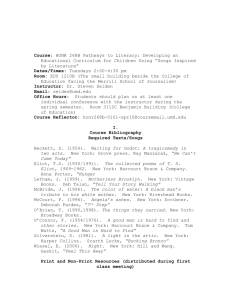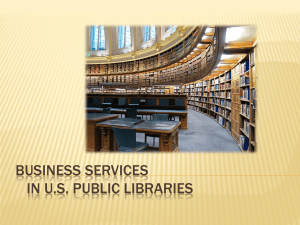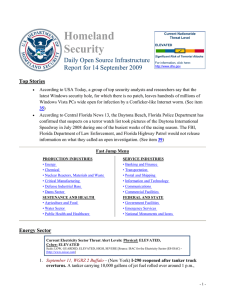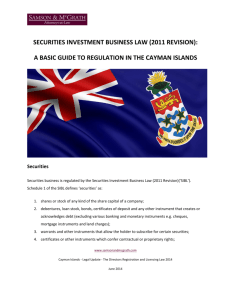A Research Library for Entrepreneurs: Kristin McDonough
advertisement
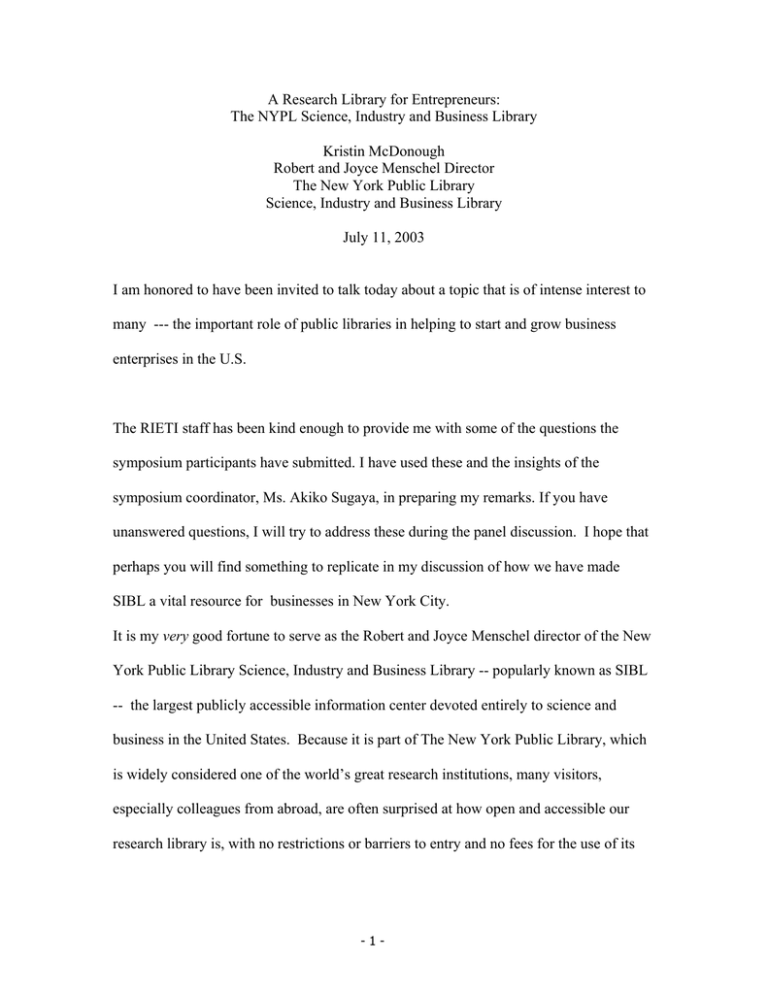
A Research Library for Entrepreneurs: The NYPL Science, Industry and Business Library Kristin McDonough Robert and Joyce Menschel Director The New York Public Library Science, Industry and Business Library July 11, 2003 I am honored to have been invited to talk today about a topic that is of intense interest to many --- the important role of public libraries in helping to start and grow business enterprises in the U.S. The RIETI staff has been kind enough to provide me with some of the questions the symposium participants have submitted. I have used these and the insights of the symposium coordinator, Ms. Akiko Sugaya, in preparing my remarks. If you have unanswered questions, I will try to address these during the panel discussion. I hope that perhaps you will find something to replicate in my discussion of how we have made SIBL a vital resource for businesses in New York City. It is my very good fortune to serve as the Robert and Joyce Menschel director of the New York Public Library Science, Industry and Business Library -- popularly known as SIBL -- the largest publicly accessible information center devoted entirely to science and business in the United States. Because it is part of The New York Public Library, which is widely considered one of the world’s great research institutions, many visitors, especially colleagues from abroad, are often surprised at how open and accessible our research library is, with no restrictions or barriers to entry and no fees for the use of its -1- resources and services. They ask us, “How do you do it?” Answering that often-asked question is my aim for today. I will try to describe as concretely and clearly as possible the steps we’ve taken to make a world-class research library indispensable to entrepreneurs -- both aspiring and established --- from a variety of backgrounds, including members of economically disadvantaged communities and recent immigrants. These include: • an attractive facility that serves encourages exploration • expansive use of technology and electronic resources • flexible staffing models • client centered services • extensive daily training • public education programs • partnerships • a prepared and motivated staff The New York Public Library is chartered as a private not for profit organization and governed by a Board of Trustees. It is not an agency of city or state government but a stand-alone private organization that serves in the public good. Although largely supported by private sources such as philanthropic individuals, foundations, and corporations, the Library does receive public funding from the city, state and federal government, most especially for its 85 neighborhood branches. Administratively, the Library is organized into two functional units, the Branch Libraries and The Research -2- Libraries, as well as Central Administration, which provides support to these units. A President and Chief Executive Officer, Dr. Paul LeClerc, oversees all programs. Currently, the Library has an annual operating budget of US$290 million (34,800,000,000 yen), a staff of 3500 individuals, and an annual traffic of 15 million onsite user visits, with an additional 4.5 million user visits to the virtual library via the Web. The Branch Library System maintains 85 neighborhood libraries in the three Boroughs of Manhattan, the Bronx and Staten Island. The Branches serve local audiences, offer collections that may be borrowed for home or office use, and provide community information, as well educational programming, training, and entertainment services. SIBL, because it offers a collection of circulating materials that readers can check out has a direct connection with the Branch Libraries system that has proven mutually beneficial. For example, the central Mid-Manhattan branch, just 6 blocks north of SIBL, runs a Job information Center which posts job openings and offers materials and seminars on career development, resume writing, and interviewing skills. There are obvious synergies with SIBL. The NYPL Research Libraries System is administered by William D. Walker, the Andrew Mellon Director, who first conceived of and developed the SIBL concept. In fact, it is possible that some of you may have heard Mr. Walker talk about planning for SIBL on one of his nine trips to visit libraries in Japan. There are four Research Libraries, all in Manhattan: -3- • The Humanities and Social Sciences Library in the landmark building at Fifth Avenue and 42nd. St, with its pensive lions guarding the collections. • The Schomburg Center for Research in Black Culture in Harlem • The New York Public Library for the Performing Arts at Lincoln Center and, • The Science, Industry, and Business Library, in bustling midtown near the Empire State Building SIBL has been open for only seven years but is the product of nearly a quarter century of internal debate about how best to shape its preeminent technology and business collections for the public good. The creation of SIBL was the single largest construction project the Library had undertaken since the opening in 1911 of the iconic Carrere and Hastings building with its pensive lions guarding the collections at 42nd St. and Fifth Avenue in midtown Manhattan. The concept behind SIBL was equally “big” – to merge the extraordinary collections and specialist staff of two Research Divisions – Science/ Technology, and Economics/ Public Affairs and to include the circulating collections from the Mid-Manhattan Branch Library. These integrated resources in a high-tech facility would serve as an engine to benefit the local economy in New York City. Seven years after opening, SIBL today functions as a center for scholarly inquiry and as a hive of entrepreneurial activity. Experienced business owners from the Service Corps of Retired Executives (SCORE) counsel aspiring entrepreneurs 30 hours a week on the nuts and bolts of starting or growing a business. An after-work series of workshops offered three nights each week by expert practitioners has made SIBL’s conference center a -4- destination venue for business- to- business networking. SIBL’s high end databases are used by hundreds of people every day to find technical literature, search patents, create mailing lists, identify their competition and seek jobs. SIBL has succeeded to a great extent in attracting broader, more diverse user groups because of the following: • Building Design The brilliant architectural firm, Gwathmey Siegel & Associates, provided: • a visually impressive, functional facility • Clean, uncluttered sight lines create an open ambience that invites exploration and inquiry while providing for supervision and service. • Abundant windows and the use of three standard heights for bookcases and all counters throughout the library provide a salutary transparency. • Everywhere, people can see others who resemble themselves working across subject areas and information formats. Circulating Collection: The decision to integrate the science and business collections from Mid-Manhattan, a bustling central lending library six blocks north of SIBL, with the merged science and business research materials, was a key factor in cultivating a new SIBL clientele. The Cullman Reading Room and Circulating Library, at the street level off SIBL’s lobby functions an attractive, familiar gateway to the research collections. Its browsing collection of over 150 popular science and business periodical titles prepares new readers for the far more extensive but closed stack serials collection of the research library. The Cullman Reading Room keeps expanding its amenities to include such inviting elements as : -5- o Shelf checks for patrons who phone in requests o Sci-tech videos interfiled with books on the same topic o State of the art equipment for onsite viewing/listening to a/v science materials, o Self-servicing of daily newspapers, and o 30 minute reservations at one-stop database and Internet workstations • Flexible Staffing Models The visual “center” of SIBL’s research level is the Harold McGraw Information Services reference desk: • Semi-circle design to provide simultaneous assistance to multiple readers who stand in one line • Librarians serve as generalists answering sci-tech, business, and legal-administrative queries. • Specialists are readily available for immediate and by-appointment service. • Paraprofessionals and student technicians “work the line” to answer informational or directional questions In the Electronic Information Center, specially trained students, monitor the workstations, handling all queries of a mechanical and technical nature, and alert librarians when readers need assistance with database choice or search strategy. • A cadre of twenty plus volunteers assume the more routine orientation and directional duties that free professional librarians for more quality attention to their customers. In addition to welcoming visitors to SIBL and referring them to service points, volunteers demonstrate the use of the reservation kiosk and self check stations, distribute literature and give tours. Some also work behind the scenes on one-time -6- projects related to collections. • Client-centered services While SIBL was being planned, the library staff redeployed from the research and branch divisions received extensive training in customer service. Over the past seven years SIBL has developed new services for customer convenience: o Periodicals on Call – Recent issues of the 50 most frequently requested titles such as The Economist are brought in from the stacks and shelved at the Delivery Desk for speedy retrieval. o Call Ahead Service – Closed stack research materials are put on reserve for researchers who phone, fax or email the titles and call numbers in advance of their visit. o Reference by Appointment – 30 minute consultations with a reference librarian to develop a workable search strategy at the start of research investigation. o E-mail reference – In addition to relying on its own staff expertise, SIBL opted early on to participate in the Collaborative Digital Reference Project (now QuestionPoint), which opened access to the experts and specialized resources of participating libraries worldwide. • Expansive provision of technology for public use The Rohatyn Electronic Information Center (EIC) is the pulse of SIBL. It provides access to: • 150 electronic databases: indexes and abstracts, the full text of over 13,000 unique ejournal titles -7- • E-Books – SIBL’s titles mainly business handbooks and computer manuals • Internet Access Five years after opening, it became clear to staff that Internet “regulars” were in the Rohatyn EIC for up to 4 or 5 hours per day. Entrepreneurs, corporate employees, independent researchers, or students who had arrived in the early afternoon would have to wait 2 to 3 hours to search one of SIBL’s subscription databases. Researchers who came by mid-day were informed by the automated kiosk that there were no workstation registrations left for the day. Soon the word was spreading that SIBL’s EIC had turned into an Internet Café and that it was not a place where serious researchers could get quick and convenient access to business and science resources. Technology was not acting as a hook to attract new users to our high end and sometimes unique databases. A year ago, SIBL managers took decisive steps to reclaim the research mission of the Library, by: • modifying the access policy, with ID required for workstation access, • utilizing the technological solution of a proxy server to block access to communication functions. • reconfiguring the EIC to reduce both the number of Internet workstations and the length of Internet reservations for email and chat use to one hour per day. • increasing both the number of Database workstations and implementing the more liberal reservation period for their use, which acted as a catalyst to promote SIBL’s science and business databases. • Increasing promotion: A new classified guide to, and list of, SIBL’s e-resources was promoted in global emails to faculty and students in metro-area science -8- departments, and to targeted email lists provided by partners such as the New York Academy of Science, professional engineering associations, and small business service providers. Presently, SIBL has stopped requiring reservations for database workstations so that researchers can be accommodated immediately and for as long as they need. The demand for these online resources continues to build and it is a market demand SIBL is delighted to meet. Post September 11, when so many workers lost offices, we tripled the number stations in the laptop docking area so that at present an increasing number of SIBL’s newest readers can access SIBL’s networked resources for their needs with virtually no time restriction at all. In just this past week, these digital databases were used for a startling variety of purposes: • A small business person used STAT-USA and Emerging Markets to locate Southeast Asian suppliers of handmade crafts to sell here in New York, and got to read late-breaking news from her home country in her native language • A fashion designer searched the Patent Office’s CASSIS databases to ensure that her newly created trademark hadn’t been used before • A college student used General Science Abstracts and Cambridge Scientific Abstracts to research aluminum recycling processes for a competitive science project • A clerical assistant from a medium-sized PR firm compiled a mailing list—with labels – of small companies in three metro-area neighborhoods using Reference USA -9- • An independent investment analyst used Bloomberg, Dow Jones Interactive, and Reuters Plus at the PaineWebber Business Information Wall to complete a 10year history of a client’s portfolio • A job-seeker visited various websites to search online for job listings and then prepared for her interviews using Mergent and General Business File. • A pro se litigant searched Nexis for insight into the regulatory environment in the country where his former employer is located An entrepreneur aiming to open a “gentle” fitness center combed Sports Business Research Network for market research reports on similar facilities aimed at her niche market, senior citizens. Two retirees who took our Companies and Contacts:Using Directories to Find Companies and People for a third time, used Gale’s Ready Reference Shelf for contact information for 30 writers they’re inviting as potential speakers for their community center’s dedication ceremony. A prospect researcher for a Jewish Philanthropies hospital drive used Million Dollar Directory to identify Fortune 500 CEOs who were Brandeis alums. A graduate student used Dissertation Abstracts to determine if her emerging perspective on the collapse of the Asian markets has been “over-researched.” An enterprising young inventor used Thomas Register of American Manufacturers for two reasons, first to identify an East Coast plant to mass produce his design and second to identify likely business to business customers for his product. - 10 - Services for Off-site Users SIBL maintains a website called the New York Small Business Resource Center which is comprised of the following features: • A Programs Locator for over 300 business assistance organizations such as SCORE listed in a searchable database • A Business Owner’s Manual with advice on starting and running a small business in New York. Direct links are provided to city agencies for regulations and forms • “Ask a Question” – answers provided by NYPL librarians as well as experts such as the Executive Volunteer Services of NYC’s Dept. of Business Services. There are many indications that not only the small business community but also municipal government consider this website to be a major service The Economic Development Committee of the New York City Council recently honored us by making the SIBL website the basis of its new print Resource Guide to Doing Business in the Five Boroughs – so popular that it went out of print almost immediately – a resounding, if ironic, promotion for the more current website available at any time from any place! Last month’s data show that the number of unique and return visitors to the site continues to rise and that the length of time that these users spend on the site is a very health 11 minutes. o TRAINING Preparing the public to use information technologies for retrieval, evaluation and the application of information has been a prime service offered by SIBL’s professional staff from the outset. With the help of a 3-year Kellogg grant, librarians developed pedagogical and classroom management skills. All librarians’ job descriptions include - 11 - teaching and each librarian offers a training session at least once a week. Corporate donors underwrote the creation of state of the art training labs with 13 workstations for student. In the first five years of SIBL’s operation, librarians have trained close to 55,000 registrants, offering free, first come first served classes in three series: Basic Library Skills, World Wide Web, and Specialized Subject Research (e.g. Using Statistics That Talk or Sell). As practice for learning the content of a new class, librarians volunteer to develop “Spotlight” sessions for colleagues on a particular database or family of sources in a field like statistics. Peers offer constructive suggestions for improvement over several weeks before the new class is debuted to the public. Videotaping of the practice sessions is also available. The current curriculum is comprised of 22 classes. Librarians lecture and give a demonstration for part of the class and then each participant gets practice time using the electronic resources. Once again, student technicians assist with the mechanics, going right to the workstation of anyone who needs help. The most popular business classes are: Market Research, Companies and Contacts: Creating Customized Mailing Lists and an introductory Small Business Information Network. Simple introductions to SIBL’s very rich technical literature related to specific local industries such as Textiles and Apparel, Food Science, and Building and Construction have been added recently. These sessions are not meant to be academic or designed to be exhaustive. They show how to identify and why to use sources that answer very basic questions. Job seekers also find these classes helpful and in fact, in the wake of September 11, were referred to a core of our classes by the Dept. of Labor as part of the formal vocational rehabilitation program. - 12 - SIBL’s commitment to entrepreneurial education means that that in addition to training individual walk-ins on a daily basis, the librarians also offer customized training sessions for school, academic, professional, non-profit, and government groups tailored to particular curricula, assignments, or needs. In addition to working with the students, SIBL offers “Train the trainer” sessions for volunteer business counselors, for high school teachers who are mentoring students in science competitions or caching debate teams, and college faculty who are overseeing students thesis work. Specially trained teachers become more effective champions of the program than any costly marketing program. A particular favorite assignment of mine is one for a product engineering class from a nearby design institute. Students have to develop a product, patent it, and bring it to market. These classes in particular are the ones that most excite the librarians instructors. The classes are advertised on the web and in commercial newsletters such as Alley Events. • Public Education Programs For the Small Business Community Three years ago SIBL librarians decided to use its meeting spaces in a new way by bringing in expert practitioners in a range of business areas and featuring them in workshops on: • Writing a business plan • Marketing your business • Obtaining financing • Promoting yourself and your business • Legal issues • Efficient bookkeeping - 13 - This series of programs has had a dramatic effect on SIBL as a place to network. Speakers volunteer their time and in return are offered exposure to a new potential client base. They regularly promote the Library’s resources and services and as one can imagine endorsement of the library’s resources from a successful entrepreneur “made it” is worth thousands of mailed brochures touting the library. A gratifying number of programs such as “Is Your Business Bankable? where a team of attorneys and bankers analyze business plans -- are brought back by audience demand. PARTNERING Another reason we can do what we do is that SIBL works closely with a number of partner groups. We have found these relationships to be mutually beneficial in that we provide them with resources and services and they provide us with audiences, promotion and their expertise. I will profile a few of them for you. WIBO, Workshop in Business Opportunities (WIBO), has for almost 40 helped minority people develop real and lasting economic power through business ownership. WIBO is non-profit, non-funded, and self-contained. Instructors serve without pay; more than half run their own businesses; many are Workshop graduates. All services and facilities are donated or are paid for by contributions of faculty, graduates, and others. WIBO is a free, sixteen-week course focusing on business strategies. There are no academic or other admission requirements. Anyone who is in or who is planning to open a business may enroll. Throughout the course, participants learn how to run a growing, profitable business by building a - 14 - detailed plan. At each three-hour session, participants focus on one particular phase of their business strategy under the guidance of a recognized expert and trained work-group leaders. WIBO participants must make and live up to a commitment to attend all classes; to arrive on time ready to work; and to devote six to twenty additional hours each week to writing their business plans. When the course is completed, participants have produced a 200-page guide for running their businesses and receive a certificate at a formal graduation and reception. SIBL librarians teach the modules on market research which are scheduled about midway in the course. They teach these sessions out in the community in the WIBO office neighborhood. One librarian even committed to taking the 16 week course and herself earned the certificate. SIBL is a presence at the graduation, where those who have completed the course staff booths that promote the products or services that they have developed. Through this relationship, the library gains the loyalty of confirmed users. And WIBO in return offers its session A Business of Your Own: Is It for You? one Saturday a month, providing sustained weekend programming of a high caliber that meets our users expectations. AWED or the American Women’s Economic Development Corporation is another non-profit which helps entrepreneurial woman start and grow their businesses through training and counseling. SIBL staff teach part of their 21 hour, 7 week class, Access to Capital, for woman who have been in business for at least 3 years. Local bankers, - 15 - accountants, and other experts cover topics such as banking products, writing a creditworthy business plan, analyzing financial needs, cash flow computation, projections, so this participation has the benefit of providing SIBL small business team members with continuing education in the real-world, contextual use of tools and information resources in the collection. SIBL librarians also attend regular AWED-sponsored events such as breakfasts and brown-bag lunch discussions on a variety of topics such as increasing market share, diversifying product line, and direct mail options. Other partners with which we are engaged in reciprocal arrangements include : • Accion, a microlending organization that works with small businesses that lack access to traditional sources of credit to help launch and grow their businesses. This group, for example, helped the private taxi and limousine community rebound when their business deceased in the wake of 9/11 • New York Industrial Retention Network, which helps manufacturers develop strategies to remain competitive. SIBL’s Small Business Team form part of the Network’s faculty, preparing sessions to demonstrate how to patent or trademark the products that the members develop. SIBL takes its workshop on intellectual property for the industrial designer to venues such as the Municipal Arts Society throughout New York City. • South Bronx Overall Economoic Development Corp. (SOBRO) is borough based and runs myriad economic development and job readiness programs for residents of the Bronx. SIBL is an active participant in a range of their events - 16 - from technology expos and small business fairs run out of local community colleges throughout the borough. Governmental Partners SIBL, as a full government and USPTO patent depository has always been in fruitful partnership with these federal administrative units. With its extraordinary teaching facilities in midtown, within walking distance from the major railway and bus stations, SIBL has proven an ideal venue for the USPTO in particular to reach out to its targeted constituencies – patent attorneys, inventors, corporate para-legals. They reciprocate by giving intensive staff training periodically to SIBL librarians. We also help to preview and beta test the interface and delivery systems of electronic products from government agencies and to serve as an efficient channel of distribution for material from an office like the Internal Revenue Service. In return, we gain reliable, substantive programming for our small business community delivered by the experts. Many government offices at the city, state, and federal level, such as the Census Bureau, having been given the mandate to increased public awareness and education, are particularly pleased to work with the Library because of the ease with which their new electronic products can be demonstrated. • Library as Place As is true with libraries across the nation, walk-in traffic at SIBL is not as high as it was five years ago. And yet, while other library colleagues worry about the relevance and perhaps even the future of libraries, we at SIBL are actively pursuing additional space to accommodate all of the demand that we have created for library as place. - 17 - Through the services, events, partnerships and attitudes described above, we have added social capital. People who have the ability to access information from their home or office or school prefer to come to SIBL. Reading and Relaxation -- Because of its location, patrons come to SIBL on breaks from work or school in order to browse magazines, readable business best sellers, and today’s Financial Times. Virtual Office --- SIBL’s high bandwith communications afford high speed connectivity. Many use the library as their place of business, because of the speed with which they can transmit the work they complete with reliance on SIBL data sources. Collaborative Learning --- People like to learn and work on projects together. Often there is a trio huddled around the Bloomberg Flat Terminals because it takes three users to exploit all of the advance features of that service. SIBL’s Electronic Training Center and the Rohatyn Electronic Information Center are set up to accommodate more than one person at a workstation. We did not have the foresight to plan for group study rooms and are planning to retrofit part of a microfilm facility for this purpose. Networking -- SIBL’s training classes and public programs are designed to leave time at the end for questions. Invariably this leads to the exchange of business cards. SIBL represents a neutral, trusted space. Librarians are not there to sell the group - 18 - anything but our free information so SIBL fosters an willing openness to talk about intitiative and ventures. Corporate Training Site SIBL’s four well-designed, cutting edge labs in midtown Manhattan are ideal for training. SIBL provides the space and trainers for competitive fees. The same mix of attractive facility in midtown and below-market rates make SIBL’s meeting rooms ideal for small business owners to rent for product demonstrations and seminars. Corporate Meeting Place Senior executives from financial services firms gather quarterly in SIBL’s Healy Hall to hear keynote addresses from industry leaders such as: • Warren Buffet, Chairman of Berkshire Hathaway • Sanford Weill, CEO of Citigroup, • Robert Rubin, Former secretary of the Treasury, • Felix Rohatyn, returning ambassador, France Showplace for Corporate Donations SIBL has proven to be an appealing setting for visible corporate philanthropy that tied to a lead institution and widely accessible to all. Bloomberg has upgraded its Financial Panel system three times since the initial gift and it realizes that its availability at SIBL is helping to create demand. The PaineWebber Business Wall is another example of a widely used amenity provided via corporate philanthropy. Stimulating Environment for the Volunteer - 19 - SIBL continues to add new and younger professionals, including library school students, to its volunteer core because it is an attractive, and stimulating place to learn while giving back . ENTREPRENEUR INTERVIEWS For us at SIBL the most telling evidence that our small business outreach program is making a difference is the testimony of entrepreneurs who credit SIBL with assistance in launching their business. Stacy Bass, the founder and now president of a Latin American café and catering restaurant Mosaico was interviewed on cable television when her restaurant opened with great fanfare. She spoke quite earnestly of the invaluable assistance she received from the SCORE counselor at SIBL who helped her shape a business plan using data about the residential demographics and the retail trade density and diversity in the several neighborhoods she was considering for site location. By happy coincidence, two blocks across from SIBL was where Mosaico ended up so now the library staff who provided her that crucial first phase of assistance are now her loyal customers. Toby Jackson, founder and CEO of LineTech industries says that he developed his textile visual inspection system after months of reading every piece of textile trade literature he could find that dealt with a process called texturizing. He found it all at - 20 - SIBL. Our collection is so comprehensive and rich that the National Endowment for the Humanities has just awarded SIBL $700,000 to preserve the complete backruns of all the titles in our textiles and fiber collection. He too found the combination of SCORE’s onsite counselor who worked with him for several years on pricing structure and SIBL’s textile trade literature a winning combination. Like Stacy Bass, Jackson gives back to SIBL whenever he can by testifying – most recently at a press conference with the New York City Council about the genesis of his business at the public library. And he stops by SCORE and the SIBL research collections at least every six months and comes away with answers to problems he didn’t know he had! Emily McHugh, president of Casauri, recounts her progressive reliance on SIBL’s collections to initially explore a range of graduate school options, then to complete projects for her MBA. She too used SIBL’s unbeatable combination of a rich and deep print collection and powerful databases along with the wisdom and encouragement of a SCORE counselor to shape her plan to develop durable yet stylish laptop cases. Her search in the online database Thomas’ Register landed her the name of the manufacturer whom she ultimately collaborated with. McHugh now uses SIBL regularly for its seminars to keep up to date in areas like effective bookkeeping. And she reaches out to others who rely on the library for information about higher education and career path by presenting seminars for the Branch Library system on how to choose a graduate school. SIBL has been able to identify some of its successful, productive entrepreneurs through their regular interaction with staff. A New Access Card issued for free to - 21 - readers who use closed stack research materials will, in the future, provide more detailed information about groups of SIBL’s users, for example, by academic affiliation and profession. Other readers will become known to us though self identification via an informal survey form that we have just started to distribute. We know that other success stories will emerge from this effort. We also know that SIBL’s blend of appealing and open facility, rich resources, accessible technology, continuous training, practical workshops, and knowledgeable, enthusiastic staff is impacting our public when we encounter the smiles of a satisfied reader. Thank you for you attention and please come visit us at SIBL – virtually, or in person!. - 22 -
